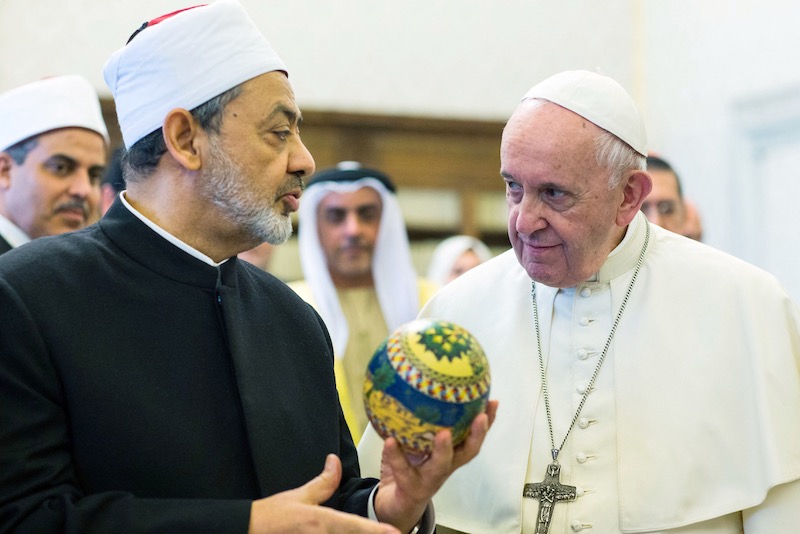From the start of his pontificate, Pope Francis has been building bridges with the Muslim world with the energy of a missionary.
He has visited several Muslim-majority countries and worked with a range of religious leaders on an agenda to combat extremism and build up “fraternity”. His efforts have inspired the United Nations to establish the first International Day of Human Fraternity, which is being celebrated today.
We can read this as trying to reframe the secular argument that religion is part of the problem when it comes to solving global conflicts. But what the Pope and his fellow leaders are trying to show that world peace is only possible if there is peace among religions. It is an example of putting religious statesmanship into action.
The UN's 4th February date was chosen because it is the date that Francis and the Grand Imam of Al-Azhar signed the landmark “Human Fraternity” document on Christian-Muslim relations in Abu Dhabi two years ago. This marked the first time a Pope and Muslim leader became joint authors of a text that laid the foundation stones to Francis’s latest encyclical, Fratelli Tutti.
Francis is now poised to take things a step further.
During his planned trip to Iraq, scheduled for 5-8 March 2021 the Pope is expected to meet Ayatollah al-Sistani, the leader of Iraq’s Shi’ite Muslims, and renowned peace-broker in the region. It is a meeting that could help Francis build an even broader relationship with the Muslim world. It is speculated that al-Sistani could add his name to the human fraternity document, a move that would bring Shi’ite support to the text. That support has been growing and seen with Mohammed Ali Shomali, a prominent Iranian Shi’ite scholar based in the UK, writing favourably about the fraternity declaration.
“When Francis signed the famous document with the Shaykh of al-Azhar, it was with a Sunni leader, so this meeting with al-Sistani seems to be a natural progression, meaning that the whole of Islam is encompassed,” Fr Christopher Clohessy, a lecturer at the Pontifical Institute for Islamic Studies in Rome, and an expert in Shi’ite studies, told The Tablet.
Aged 90, al-Sistani is a Nobel-prize nominee, and renowned as a peace-maker in Iraq and has stood up to the religious extremism that has blighted the country since 2003. He has consistently appeared in one of the top ten positions in a listing of the world’s 500 most influential Muslims.
|
Make war not peace, says Pope in UAE
|
“Al-Sistani is an extraordinarily important figure in the Shi’i Islamic world,” said Fr Clohessy, whose books on the daughter and granddaughter of the Prophet Muhammed recently received an award from Iran’s government.
“He also played an increasingly prominent role as peacemaker and treaty-broker in the regional religious and political affairs of post-invasion Iraq urging the clergy to engage with justice and politics in order to better guide the Iraqi people, calling for a democratic vote for the purpose of forming a transitional government, encouraging the populace (including women, whose participation he urged in special fatwa).”
If al-Sistani signs the human fraternity text, therefore, it will send a powerful signal. Approximately 85 per cent of the world’s Muslims are Sunni, and 15 per cent Shia. For centuries, Sunni and Shia Muslims lived alongside one another peacefully, but at the end of the twentieth-century tensions exploded and the Sunni-Shia divide became embroiled in political tensions across the Middle East. For his part, al-Sistani has resisted this trend, pleading with his community not to respond with violence to extremists' attacks on them. He has also appealed for Iraqis to support the Government against Islamic State (IS).
Clohessy says that al-Sistani and the Pope are “extraordinarily similar in outlook” and if an encounter does occur, it will be a “will be a meeting of minds.”
Days after his election as Bishop of Rome, Francis met with diplomats from across the world. “It is not possible to build bridges between people while forgetting God,” he told them. “Hence it is important to intensify dialogue among the various religions, and I am thinking particularly of dialogue with Islam.”
He is not on a solo mission. The Pope has grounded his efforts with other religions in the teaching of the 1962-65 Second Vatican Council, which transformed Catholic-Jewish relations and described the “esteem” the Church has for Muslims. The council also ruled in favour of religious freedom.
His human fraternity document with the Grand Imam, Francis says, “does not move one millimetre away from the Second Vatican Council” and builds on the dialogue it opened up between the Church and other religions. “It is a process,” the Pope explained. “And processes mature, like flowers, like fruit.”
It is also a process that is only just beginning.



 Loading ...
Loading ...
What do you think?
You can post as a subscriber user ...
User comments (0)